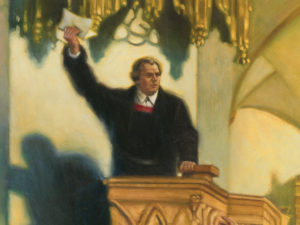by Rev. A. Brian Flamme
 Praying for a kingdom seems a bit strange for citizens of the 21st century. We’re used to parliaments, congresses, representatives, and presidents. In our minds kings and kingdoms seem more at home in the distant past and fairy tales. Even in countries with a royal family and aristocracy, they exist as figureheads, as reminders of a dignified past that has given way to more equitable means of governance.
Praying for a kingdom seems a bit strange for citizens of the 21st century. We’re used to parliaments, congresses, representatives, and presidents. In our minds kings and kingdoms seem more at home in the distant past and fairy tales. Even in countries with a royal family and aristocracy, they exist as figureheads, as reminders of a dignified past that has given way to more equitable means of governance.
So why should we pray for a kingdom? Because Christ commands it (Matthew 6:9ff). It’s true that men in this world use power to further their own ends at the expense of others. But it’s not so with our Lord Jesus. We pray with joy for his kingdom because it frees and saves.
How did the Son of God bring his kingdom into this world? He set aside his glory. He was born of a virgin, not in a palace, but among the animals because there was no room for him in the inn (Luke 2:7). His public coronation didn’t happen a throne room, but in the muddy waters of the Jordan (Matthew 3:17). He came to his own city in triumph, not on a warhorse surrounded by his legions, but on a donkey surrounded by a throng of sinners crying for their salvation (Matthew 21:1-11). On the night of his betrayal when Peter drew his sword to fight for Jesus’ kingdom, his King stayed his hand (John 18:11).
Jesus teaches, “My kingdom is not of this world” (John 18:36). Jesus doesn’t desire the blood of his enemies to win his kingdom. He shed his own blood. By being lifted up on the throne of his cross, Jesus cast out the devil and overcame his reign of sin and lies (John 12:31-33). By Jesus’ resurrection on the third day, our King shattered the chains of death and the grave so that “whoever believes in him should not perish but have eternal life” (John 3:16).
Now that Jesus lives and reigns at the Father’s right hand, should we expect the kingdom to manifest itself in glory? The Lord’s disciples asked the same thing. “Lord, will you at this time restore the kingdom to Israel?” Jesus said to them, “It is not for you to know times or seasons that the Father has fixed by his own authority. But you will receive power when the Holy Spirit has come upon you, and you will be my witnesses in Jerusalem and in all Judea and Samaria, and to the end of the earth” (Acts 1:6-8).
Jesus never denies that the kingdom will appear before everyone in glory and power (Matthew 24:27; 30). But when that happens isn’t our concern. What matters for us is power from the Holy Spirit placed upon the Apostles to preach to the ends of the earth.
So, when Luther poses the question, “What does it mean that God’s kingdom comes?” he answers,
 The kingdom of God certainly comes by itself without our prayer, but we pray in this petition that it may come to us also.
The kingdom of God certainly comes by itself without our prayer, but we pray in this petition that it may come to us also.
How does God’s kingdom come?
God’s kingdom comes when our heavenly Father gives us His Holy Spirit, so that by His grace we believe His holy Word and lead godly lives here in time and there in eternity.[i]
Luther reiterates this scriptural teaching in his Large Catechism.
What is the kingdom of God? Answer: Simply what we heard above in the Creed, namely, that God sent his Son, Christ our Lord, into the world to redeem and deliver us from the power of the devil, to bring us to himself, and to rule us as a king of righteousness, life and salvation against sin, death, and an evil conscience.
The coming of God’s kingdom to us takes place in two ways: first, it comes here, in time, through the Word and faith, and second, in eternity, it comes through the final revelation.[ii]
Let’s think about these ways in which Jesus’ kingdom comes. Sometimes it strikes our ear strangely when we learn that God’s kingdom comes even without our prayer “but we pray in this petition that it may come to us also.” How can a kingdom come and yet we should pray that it also comes to us? First, we acknowledge that God created and sustains creation by his power (Psalm 19:1; 103:19; 145:13). This aspect of his kingdom is present among all people and extends to the ends of the earth. We also know that God’s kingdom will come in glory at the end of time when Jesus comes to judge the living and the dead (Revelation 1:7; Philippians 1:9-11; 2 Peter 3:13). No matter where you live, what you think, and what you believe, these aspects of God’s kingdom are here (power) and coming (glory). They’re inescapable and leaves sinners whose consciences are troubled by God’s judgment little comfort.
But we also know Christ and his saving work. We know it because his Word has been put into the mouths of his apostles and ministers. This is the reign of Christ prophesied by Psalm 110:2: “The Lord sends forth from Zion your mighty scepter. Rule in the midst of your enemies!” There we find a promise and a command from the Father to his beloved Son. Luther writes,
 This scepter is nothing else than the office of the public ministry, which the Lord Christ began Himself and later on commanded to be extended by His messengers, the apostles and their successors, and to be continued until the Last Day. In this consists His entire kingdom and government as far as it can be seen or grasped outwardly, for here He indicates and mentions nothing else by which this King will rule except this scepter. There will be no other external sign or mark by which His kingdom can be recognized.[iii]
This scepter is nothing else than the office of the public ministry, which the Lord Christ began Himself and later on commanded to be extended by His messengers, the apostles and their successors, and to be continued until the Last Day. In this consists His entire kingdom and government as far as it can be seen or grasped outwardly, for here He indicates and mentions nothing else by which this King will rule except this scepter. There will be no other external sign or mark by which His kingdom can be recognized.[iii]
God’s kingdom of grace is the kingdom that comes through “Word and faith.” In this kingdom I discover God’s Son who dies for me, who baptizes me, forgives me, and feeds me with his body and blood. Standing in this grace, the kingdoms of power and glory cease to threaten. I learn to give thanks to God for his power that holds sin and destruction at bay in this world, that gives daily bread everyone, even to evil people. I learn to pray that Jesus comes quickly, that the righteousness that I have by faith would be vindicated before the eyes of all.
The Rev. A. Brian Flamme is a pastor at Hope Lutheran Church, Aurora, Colo.
[i] Small Catechism, Lord’s Prayer, 2nd Petition
[ii] LC III 53 (Kolb-Wengert, 447)
[iii] LW 13:265-266
